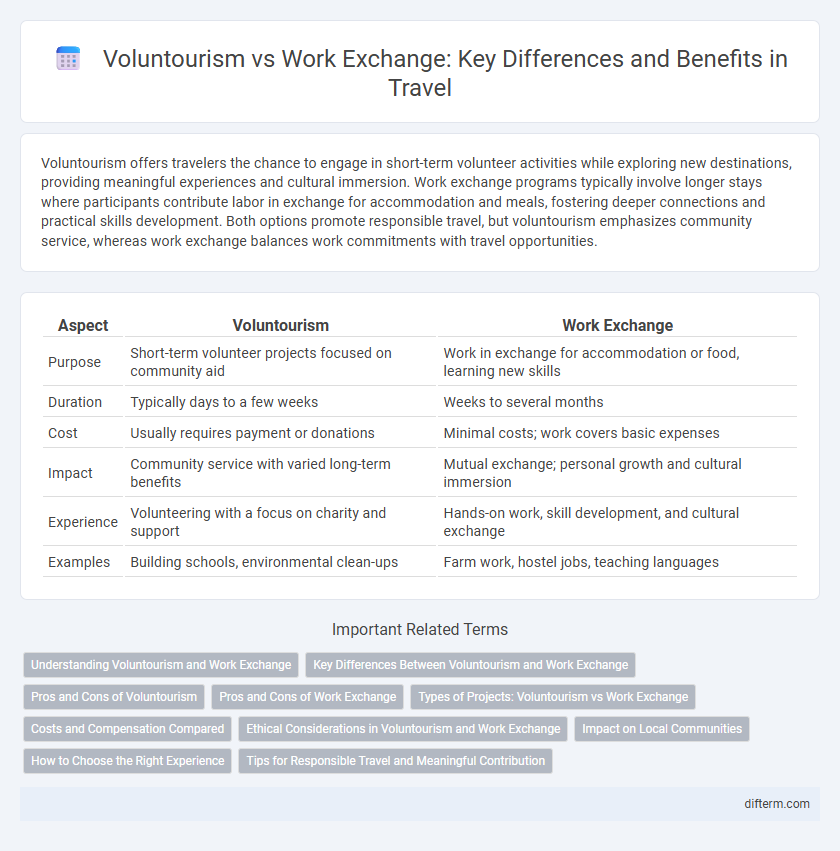Voluntourism offers travelers the chance to engage in short-term volunteer activities while exploring new destinations, providing meaningful experiences and cultural immersion. Work exchange programs typically involve longer stays where participants contribute labor in exchange for accommodation and meals, fostering deeper connections and practical skills development. Both options promote responsible travel, but voluntourism emphasizes community service, whereas work exchange balances work commitments with travel opportunities.
Table of Comparison
| Aspect | Voluntourism | Work Exchange |
|---|---|---|
| Purpose | Short-term volunteer projects focused on community aid | Work in exchange for accommodation or food, learning new skills |
| Duration | Typically days to a few weeks | Weeks to several months |
| Cost | Usually requires payment or donations | Minimal costs; work covers basic expenses |
| Impact | Community service with varied long-term benefits | Mutual exchange; personal growth and cultural immersion |
| Experience | Volunteering with a focus on charity and support | Hands-on work, skill development, and cultural exchange |
| Examples | Building schools, environmental clean-ups | Farm work, hostel jobs, teaching languages |
Understanding Voluntourism and Work Exchange
Voluntourism involves travelers participating in short-term volunteer projects that focus on community development, conservation, or humanitarian aid, often requiring minimal skills but significant cultural immersion. Work exchange programs offer travelers the opportunity to trade labor, such as farm work, hostel assistance, or teaching, for accommodation and meals, providing a practical way to reduce travel costs while gaining hands-on experience. Both approaches emphasize meaningful engagement with local communities but differ in commitment levels, work scope, and the balance between service and cultural exchange.
Key Differences Between Voluntourism and Work Exchange
Voluntourism involves short-term volunteer projects often combined with tourism, emphasizing cultural immersion and humanitarian aid, while work exchange typically requires a longer commitment, trading labor for accommodation or food in sectors like hospitality or farming. Voluntourism projects frequently attract travelers seeking meaningful experiences with structured community impact, whereas work exchange offers practical skills development and cost-effective travel opportunities. The key difference lies in voluntourism's focus on altruistic goals versus work exchange's emphasis on mutual benefit and cultural exchange.
Pros and Cons of Voluntourism
Voluntourism offers travelers immersive cultural experiences and the opportunity to contribute to local communities, promoting social impact and personal growth. However, it can sometimes lead to unskilled labor, dependency, and unintended harm if not properly managed or aligned with community needs. Careful selection of reputable programs ensures ethical engagement and maximizes positive outcomes for both volunteers and host communities.
Pros and Cons of Work Exchange
Work exchange offers travelers immersive cultural experiences by trading labor for accommodation, often reducing travel costs significantly. It allows skill development and authentic local engagement but may involve inconsistent work hours and limited leisure time. Unlike voluntourism, work exchange prioritizes mutual benefit, which can sometimes lead to less structured or impactful community contributions.
Types of Projects: Voluntourism vs Work Exchange
Voluntourism projects typically involve short-term community development, wildlife conservation, or cultural immersion activities designed for travelers seeking meaningful experiences. Work exchange programs offer a broader range of tasks including farm work, hostel management, and eco-projects, often requiring longer commitments and providing practical skills. Both types of projects emphasize cultural engagement but differ in structure, duration, and participant involvement.
Costs and Compensation Compared
Voluntourism often requires participants to pay significant fees covering accommodation, meals, and program coordination, resulting in higher upfront costs with little financial compensation. Work exchanges typically involve travelers trading labor for lodging and food, minimizing expenses while providing tangible compensation through daily necessities. Evaluating costs reveals that work exchanges offer more practical financial benefits compared to voluntourism's fee-driven model.
Ethical Considerations in Voluntourism and Work Exchange
Ethical considerations in voluntourism and work exchange revolve around the genuine impact on local communities and avoidance of dependency or exploitation. Voluntourism often risks prioritizing traveler experience over sustainable benefit, whereas work exchange programs typically foster reciprocal cultural engagement and skill-sharing. Ensuring transparency, respect for local customs, and measurable community outcomes are essential for ethical participation in both forms of travel.
Impact on Local Communities
Voluntourism often provides short-term assistance but risks fostering dependency in local communities by prioritizing traveler experiences over sustainable development. Work exchange programs typically encourage deeper cultural immersion and skill-sharing, promoting more equitable relationships and lasting benefits for host communities. Effective impact arises when initiatives align with community needs, ensuring empowerment and capacity-building rather than creating economic or social imbalances.
How to Choose the Right Experience
Choosing the right experience between voluntourism and work exchange depends on aligning travel goals with personal skills and desired impact. Voluntourism offers short-term community service opportunities ideal for cultural immersion and social contribution, while work exchange provides longer-term, skill-based work often paired with accommodation to reduce travel costs. Evaluating factors such as commitment length, type of work, cultural engagement, and ethical considerations ensures a meaningful and responsible travel experience.
Tips for Responsible Travel and Meaningful Contribution
Voluntourism often centers on short-term projects that may lack long-lasting impact, while work exchange programs typically involve more immersive and skill-based contributions, fostering sustainable community development. To ensure responsible travel, prioritize collaborations with reputable organizations that emphasize local needs, cultural respect, and environmental sustainability. Meaningful contributions arise from actively engaging with host communities, acquiring relevant skills beforehand, and maintaining clear communication about expectations and outcomes.
voluntourism vs work exchange Infographic

 difterm.com
difterm.com